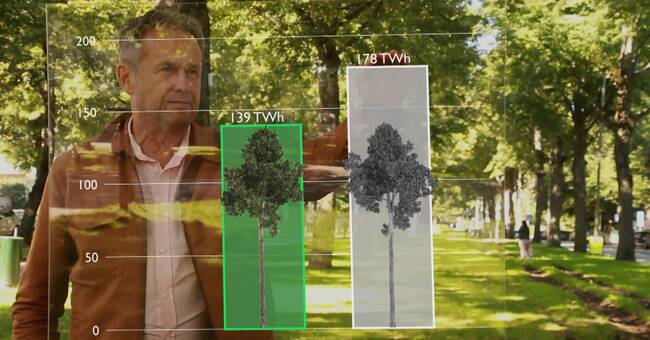About 20 industrial industries have joined the government's project Fossil-Free Sweden to zero climate emissions by 2045. An important solution is for petrol and diesel to be replaced with biofuels from forest residues and agriculture.
- The forest is a key player when Sweden becomes the world's first fossil-free welfare state.
Without the forest, we will not fix this, says Svante Axelsson who is the national coordinator for Fossil-Free Sweden
Forest fuel is not enough for everyone
The industry's previous calculation in 2018 had mortgaged the forest far above the treetops.
When the wish list of all industries was summed up, it was 178 terrawatt hours of forest biofuel.
According to the new report, there are only 139 terrawatt hours in 2045 that can be taken out sustainably.
Now the calculation has been reduced by a fifth.
Fossil-free Sweden's new report points out several industries that cannot use as much bioenergy from the forest as they intended in 2045.
Electric cars and waste heat part of the solution
All cars and trucks must run on electricity in the future, only then will Swedish forest fuel be enough for ships and aircraft.
The district heating plants are allowed to stop burning wood chips and switch to rock heating and waste heat from data halls and factories, and the sawmills and pulp mills need to be more efficient so they use less forest residues in their processes.
- Then we have a sustainable solution for Sweden's climate goals, Svante Axelsson believes.
The report calls for continued major clear-cutting
Fossil-free Sweden's calculation is based on forestry continuing as now with large clear-cuts that provide cheap raw materials for the pulp industry and biofuels.
Something that meets with criticism from researchers.
-Fossil-free Sweden has assumed that we will have the same climate-efficient forestry that we have today.
Just look at the EU's new climate law where they say that the biggest climate benefit with the forest is that we will increase the forest stock.
It is simple mathematics, then there will be less left for both pulp and for biofuels, says Thomas Hahn who is a researcher in ecological economics at the Stockholm Resilience Center.
Do not miss anything about the climate! Receive SVT's newsletter in your inbox every week.

